Light at the end of the twilight zone .. the conscience of the nation returns?
May 14th, 2005 | By Counterweights Editors | Category: Ottawa Scene SATURDAY, MAY 14, 2005. 5 AM. According to CTV News, all four Canadian parties “have now agreed to sit down and meet to discuss a fair strategy for dealing with some of the MPs who are sick and unable to attend the vote,’ NDP Leader Jack Layton said Friday evening.”
SATURDAY, MAY 14, 2005. 5 AM. According to CTV News, all four Canadian parties “have now agreed to sit down and meet to discuss a fair strategy for dealing with some of the MPs who are sick and unable to attend the vote,’ NDP Leader Jack Layton said Friday evening.”
Jack Layton’s comments have apparently been inspired by his fellow New Democrat MP Ed Broadbent’s offer to “pair” (as the ancient parliamentary language has it) with Conservative MP Darrel Stinson, whose scheduled cancer surgery next week means he will have to miss the vote. What this ought to do practically is disarm the increasingly overwrought tactical struggle about the vote’s exact timing.
How does pairing work?
The point of pairing is that both sides of the pair vote or not vote together. In this particular case both sides will be a vote short, and neither will have a vote advantage. If Mr. Broadbent pairs with Mr. Stinson and Mr. Stinson cannot vote this coming Thursday, May 19, neither can Mr. Broadbent. Or as Ed Broadbent has gone on to explain: “We’re not losing anything … What we’re potentially doing is failing to take advantage of a very sick MP.”
Joining in on the new good sportsmanship, the Liberals have also “offered to pair Resources Minister John Efford, who’s sick with diabetes.” The point here presumably is that if Darrel Stinson in the Conservative-Bloc Quebecois alliance is going to be paired with someone in the Liberal-New Democrat alliance, it might as well be another sick MP, rather than Ed Broadbent, who is altogether healthy and able to make it to his seat in the House in time for the vote.
That still leaves the case of “Conservative MP Dave Chatters, who is also ill with cancer.” In fact, both Mr. Stinson and Mr. Chatters were present for the start of the Conservative-Bloc-Quebecois full-court press in Parliament this past week, at the so-called mere procedural vote against the government on Tuesday, May 10. It is now clear that Mr. Stinson will not be present this coming week. But there has so far been no suggestion that this will apply to Mr. Chatters as well. In any case, New Democrat MP Alexa McDonough has also “volunteered to give up her vote,” should this prove necessary.
On the other hand, another MP who is battling cancer, independent Chuck Cadman, is still indicating that “he’s planning to travel to Ottawa for the vote” this coming week – even though he was unable to be present for any of the various dress rehearsals this past week. This means that, as has been the case in strict logic all along, the ultimate effective confidence vote in Paul Martin’s Liberal minority government this Thursday, May 19 should turn strictly around the decisions of the three current independent MPs, without any unsavory calculations that take advantage of very sick MPs (while allowing admiration for Mr. Cadman’s determination and ability to show up for the vote in spite of his current illness.)
Is the public mood on an early election changing?
 Assuming that all appropriate pairings to prevent taking advantage of very sick MPs actually can be quickly and effectively arranged as Jack Layton has suggested, what this also ought to do is altogether drain whatever strategic logic there has been in the Conservative-Bloc objections to waiting until Thursday, May 19 for the decisive vote to take place.
Assuming that all appropriate pairings to prevent taking advantage of very sick MPs actually can be quickly and effectively arranged as Jack Layton has suggested, what this also ought to do is altogether drain whatever strategic logic there has been in the Conservative-Bloc objections to waiting until Thursday, May 19 for the decisive vote to take place.
Then as on any earlier date (i.e., Monday, Tuesday, or Wednesday) the Liberal-New Democrat alliance is going to need the votes of all three independents, and finally Speaker Peter Milliken too, to beat back the Conservative-Bloc vote of non-confidence in the Martin government. Just to review the current intelligence here again, one of the three, Carolyn Parrish, has already indicated that she will be voting with the Liberals and New Democrats. The other two, David Kilgour and Chuck Cadman, are still indicating that they have not yet made up their minds.
On virtually all the current vibrations, it will not be at all easy for the Liberals and the New Democrats to win the vote in Parliament this coming week. Whatever else, the latest very aggressive displays of the Conservative-Bloc Quebecois Concordat in Parliament just may have started to shift the wider public mood on the need for a fresh federal election very soon (and, still more to the point, the moods of David Kilgour and Chuck Cadman).
Regardless of what you think about anything else, it does seem increasingly reasonable to guess that the present assortment of party politicians in Ottawa is never going to be able to settle down and give the people of Canada any extended period of stable government. It is still less than a year since the last federal election. But maybe it does finally make most sense to shake the box again right now, and try to come up with some combination that works better, or even at all.
Conscience of the nation
 Especially in this atmosphere, there is at least something refreshing about Jack Layton’s, Ed Broadbent’s, and Alexa McDonough’s latest parliamentary pairing proposals. Way back when, it used to be said that the New Democrats had no hope of actually forming a federal government in Canada, but did nonetheless give good service as a kind of conscience of the political nation.
Especially in this atmosphere, there is at least something refreshing about Jack Layton’s, Ed Broadbent’s, and Alexa McDonough’s latest parliamentary pairing proposals. Way back when, it used to be said that the New Democrats had no hope of actually forming a federal government in Canada, but did nonetheless give good service as a kind of conscience of the political nation.
For at least a brief moment here in the harsher world of the early 21st century the heirs of J.S. Woodsworth and Tommy Douglas seem to have returned to this role. And this does somehow suggest that even the more immediate future of Canadian federal politics can’t be quite that bad yet. There are still some reasons to keep hope alive.
MAY 13: IN THE TWILIGHT ZONE … Monday or Thursday, Dezainde, Darfur, and Chuck Cadman on cynical voters
 FRIDAY, MAY 13, 2005. 5:00 PM. Yesterday Conservative leader Stephen Harper “called for a vote of confidence Monday, after teaming up with the Bloc Quebecois to successfully shut down Parliament … for the second day in a row.” And now this particular dynamic duo has made it the third day in a row.
FRIDAY, MAY 13, 2005. 5:00 PM. Yesterday Conservative leader Stephen Harper “called for a vote of confidence Monday, after teaming up with the Bloc Quebecois to successfully shut down Parliament … for the second day in a row.” And now this particular dynamic duo has made it the third day in a row.
Paul Martin, who does remain prime minister and head of government for the moment, is still looking to “a confidence showdown next Thursday in a pair of votes on two pieces of budget legislation.” Meanwhile, Daniel Dezainde, a former director-general of the federal Liberal Party’s Quebec wing, has been testifying at the Gomery inquiry about “the Twilight Zone TV series.” Right now this also seems an apt metaphor for Canadian federal politics writ large. (And the currency markets apparently agree.)
* * * * * *
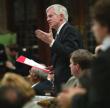 One of the figures out there deep in the twilight is David Kilgour – the former Liberal but now independent MP from Alberta, who voted with his old party this past Tuesday, but may or may not vote the same way this coming Thursday. Or Monday, if for some inexplicable reason Paul Martin loses faith in his own understanding of the correct principles, and justness of his cause, as he sees it, and gives in to Mr. Harper’s demand for a confidence vote then.
One of the figures out there deep in the twilight is David Kilgour – the former Liberal but now independent MP from Alberta, who voted with his old party this past Tuesday, but may or may not vote the same way this coming Thursday. Or Monday, if for some inexplicable reason Paul Martin loses faith in his own understanding of the correct principles, and justness of his cause, as he sees it, and gives in to Mr. Harper’s demand for a confidence vote then.
Meanwhile again, it seems that Prime Minister Martin may not have given in quite enough to David Kilgour’s demand for “at least 500 troops” from the already hard-pressed Canadian forces, to help restore some justice to the Darfur region of Sudan. Mr. Martin “said Thursday that there would be at least 100” troops. Will that finally be enough for Mr. Kilgour? Here as in so many other places lately, we will just have to wait and see.
* * * * * *
 And then there is the other crucial independent MP Chuck Cadman, still recovering from chemotherapy treatments in his Surrey North riding in BC. He “says he still hasn’t decided whether to vote May 19 to keep the Liberal minority government in power.” (May 19 is the Thursday, not the Monday, but it has also been reported that Mr. Cadman will be in Ottawa by “Sunday and that gives me the whole week … in case something comes up before Thursday.”)
And then there is the other crucial independent MP Chuck Cadman, still recovering from chemotherapy treatments in his Surrey North riding in BC. He “says he still hasn’t decided whether to vote May 19 to keep the Liberal minority government in power.” (May 19 is the Thursday, not the Monday, but it has also been reported that Mr. Cadman will be in Ottawa by “Sunday and that gives me the whole week … in case something comes up before Thursday.”)
Opinion in Chuck Cadman’s suburban Vancouver riding – which he has said he will take as his ultimate guide – has apparently shifted somewhat since an April 2728 local poll, that suggested a quite clear majority of his constituents did not want an early federal election. “Right now,” he is saying, “they are about evenly split. They’re a little bit leaning more towards, by a few percentage points, about waiting to vote until after Gomery or until after the testimony is finished … But it’s very close. It’s very close. The other side is saying, ‘Go now, we want an election now.'”
Reuters Canada has reported as well that “Chuck Cadman … being treated for cancer at home in British Columbia … said watching the political battle from afar’ has given him the perspective of the average citizen. I understand why people have become so cynical about politics and politicians. We’ve brought this on ourselves,’ Cadman told Vancouver radio station CKNW.”
* * * * * *
 It seems a safe enough guess that not too many of Chuck Cadman’s cynical average citizens care about whether the effective parliamentary confidence vote that will also decide whether there is going to be another Canadian federal election this June 27, or thereabouts, takes place on Monday or Thursday next week. And the raw power lust of the inside-Ottawa debate over the timing of this vote no doubt only increases the cynicism of the electorate.
It seems a safe enough guess that not too many of Chuck Cadman’s cynical average citizens care about whether the effective parliamentary confidence vote that will also decide whether there is going to be another Canadian federal election this June 27, or thereabouts, takes place on Monday or Thursday next week. And the raw power lust of the inside-Ottawa debate over the timing of this vote no doubt only increases the cynicism of the electorate.
Arguably enough, it could all be worthwhile in the end if this were somehow to become an election issue too, whenever the election takes place. Or would that be a little too much like the Kingdom of Heaven upon earth, especially in what many people are saying is an increasingly religious age?
MAY 12. WAITING FOR THE NEXT CANADIAN ELECTION … Whatever else, it will all be clear at last on May 19?
 THURSDAY, MAY 12, 2005. 11:35 AM. The Tories and the Bloc are continuing their aggressive war in Parliament today. And they probably do have the capacity to ensure that absolutely nothing constructive gets done in Ottawa over the next week. But will it really matter in the end?
THURSDAY, MAY 12, 2005. 11:35 AM. The Tories and the Bloc are continuing their aggressive war in Parliament today. And they probably do have the capacity to ensure that absolutely nothing constructive gets done in Ottawa over the next week. But will it really matter in the end?
As explained in a classic old textbook on The Government of Canada, the rules of procedure in Parliament “hold the balance between the rights of the private members and the rights of the cabinet, but the balance tends to lean consistently to one side and help the cabinet get its measures passed and its supplies voted, for whatever else happens the government of Canada must go on.”
The Tories and the Bloc, it seems, have never stumbled across these sentences and are loath to accept the main burden of what they say. But this text may remain the best initial explanation of why it is Prime Minister Paul Martin’s proposal to hold a clear confidence vote on the budget next Thursday, May 19 that still seems to set the bottom line for Canadian federal politics over the next seven days – despite the government’s already having lost a number of votes in Parliament.
On Wednesday May 11, the Conservatives and the Bloc Quebecois did show more than once that, as Conservative leader Stephen Harper stressed to a television camera in the foyer, they and not the government had control of the House – at least on this particular afternoon. But the exact matter of “on this particular afternoon” (or Thursday, May 12, etc.) is crucial here as well.
If the Conservatives and the Bloc had a clearer and more stable majority themselves, some of their claims about “violating basic constitutional and democratic principles” might make more sense. Yet as everyone looking hard can see, the real balance of power in the present Parliament is so close that the Liberals (and New Democrats and all three current independent MPs) still might finally win a confidence vote on the budget this coming Thursday, May 19.
It seems wise and sensible enough that the rules of parliamentary procedure should allow the government to test the real feeling of the House one last time in such circumstances. That is what the government has chosen to do. And it is not easy to see how the authors of The Government of Canada would disapprove. Next week is soon enough for the people of Canada to learn just when their next federal election will be.
MAY 11. ROUND 1: CONSERVATIVES + BLOC QUEBECOIS = 153 … LIBERALS + NEW DEMOCRATS = 150 … Now the question is when is Round 2?
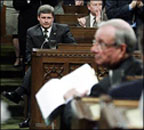 OTTAWA. Wednesday, May 11, 2005. 1:30 PM. So the vote on the Conservative-Bloc Quebecois procedural motion calling on the Public Accounts Committee “to recommend that the government resign because of its failure to address the deficiencies in governance of the public service” is over. And Paul Martin’s Liberal minority government and its current New Democrat allies have lost.
OTTAWA. Wednesday, May 11, 2005. 1:30 PM. So the vote on the Conservative-Bloc Quebecois procedural motion calling on the Public Accounts Committee “to recommend that the government resign because of its failure to address the deficiencies in governance of the public service” is over. And Paul Martin’s Liberal minority government and its current New Democrat allies have lost.
Technically, or even legally and constitutionally, the Liberals’ position that this was not strictly a confidence motion and does not actually oblige them to resign immediately seems correct as far as it goes. Yet assorted neutral authorities and other close observers, in various parts of the country, also seem to agree that if Paul Martin’s government wants to remain in office much longer, it will have to win a subsequent clear and explicit confidence motion in the very near future.
With this advice in mind, Prime Minister Martin himself has now proposed just such a vote, on the federal budget, for next Thursday, May 19. The clear hiddden agenda here is that by this time BC independent Chuck Cadman might be well enough to travel to Ottawa and vote for the government. Along with the two cabinet ministers who didn’t show up yesterday, that just might set the stage for reversing yesterday’s result in Parliament – as Liberal Speaker Peter Milliken votes to break a 153153 tie.
Following their hidden agenda, Conservative leader Stephen Harper and the Bloc’s Gilles Duceppe are proposing that the vote should be held today, when they are certain to win again. The game will resume when the House meets this afternoon. Stay tuned.
MAY 10:Â MEANWHILE BACK AT THE PARLIAMENTÂ … Waiting for the Public Accounts Committee vote
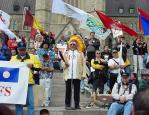 OTTAWA. Tuesday, May 10, 2005. 6:00 AM. Even as the four Canadian federal party leaders were up in an airplane over the Atlantic Ocean, returning from their all-too-short vacation in the Netherlands, the ordinary Members of Parliament back in Ottawa seem to have begun the long-awaited quick march to wherever it is Canadian federal politics is going at last.
OTTAWA. Tuesday, May 10, 2005. 6:00 AM. Even as the four Canadian federal party leaders were up in an airplane over the Atlantic Ocean, returning from their all-too-short vacation in the Netherlands, the ordinary Members of Parliament back in Ottawa seem to have begun the long-awaited quick march to wherever it is Canadian federal politics is going at last.
Just how quick the march will be remains somewhat unclear. But the Conservatives, resolutely backed by the Bloc Quebecois, have now introduced a parliamentary motion calling on the Public Accounts Committee “to recommend that the government resign because of its failure to address the deficiencies in governance of the public service.”
This motion could be voted on as early as 5:45 PM this evening, Tuesday, May 10. The Globe and Mail is now reporting that it actually will be. At the moment, however, a small majority of the respondents to the same reputable journal’s online readers poll are predicting that Paul Martin’s Liberal minority government “will survive to the end of the week.”
The Bloc-Conservative Concordat: Will It Have the Votes to Win?
 Some credit on the neo-Machiavellian scorecard for finally pushing this manoeuver through apparently goes to both the Conservatives and their worldly allies in the Bloc. The Liberals are still saying they are not worried. But the latest intelligence reported in Canada’s self-proclaimed national newspaper suggests they probably should be.
Some credit on the neo-Machiavellian scorecard for finally pushing this manoeuver through apparently goes to both the Conservatives and their worldly allies in the Bloc. The Liberals are still saying they are not worried. But the latest intelligence reported in Canada’s self-proclaimed national newspaper suggests they probably should be.
Technically, the kind of procedural instruction to the Public Accounts Committee involved cannot finally be a non-confidence motion. So even if the government loses the vote, its initial indications have been that it will not resign. If it is going to be defeated, it still wants to be defeated on a budget vote – which the Liberal brain trust figures will have better optics in any early election campaign.
But what seems increasingly likely is that the Tories and the Bloc together actually do have the votes to win their “deficiencies in governance” motion. Both parties say they will be fielding full slates of members, regardless of illness or anything else.
 The New Democrats have made clear that they will be voting with the Liberals, as their agreement on budget extensions commits them to do. In theory, everything will depend on exactly what the two uncommitted independents Chuck Cadman and David Kilgour decide to do. If they both voted with the Liberals and the New Democrats, the Martin government could still defeat the Conservative-Bloc motion.
The New Democrats have made clear that they will be voting with the Liberals, as their agreement on budget extensions commits them to do. In theory, everything will depend on exactly what the two uncommitted independents Chuck Cadman and David Kilgour decide to do. If they both voted with the Liberals and the New Democrats, the Martin government could still defeat the Conservative-Bloc motion.
In this case, new vistas of comparative longevity for the Martin minority government could open up. The Globe and Mail, however, is now reporting that “B.C. Independent MP Chuck Cadman, who had chemotherapy treatment yesterday, will not be there to support the Liberals, so the Tories should have the votes to win.”
The Blessings of Canada’s Parliamentary Democracy
As noted, even if the Liberals and New Democrats do lose on this initial test of the real armed might in Parliament, the government has made it quite clear it has no intention of immediately resigning.
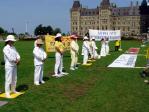 Yet if there finally is a vote tonight and the Liberals do lose it, then it does become increasingly difficult to see how Paul Martin’s government can remain in office too much longer. The Liberals themselves have acknowledged that if you take the current procedural motion “calling upon the Public Accounts Committee to recommend” a step further – and if the committee does so recommend, so to speak – the question of confidence will be clear, and a defeat on a similar motion in this setting would properly prompt the resignation of the government.
Yet if there finally is a vote tonight and the Liberals do lose it, then it does become increasingly difficult to see how Paul Martin’s government can remain in office too much longer. The Liberals themselves have acknowledged that if you take the current procedural motion “calling upon the Public Accounts Committee to recommend” a step further – and if the committee does so recommend, so to speak – the question of confidence will be clear, and a defeat on a similar motion in this setting would properly prompt the resignation of the government.
All technicalities and procedural tricks aside, that is to say, the time-tested logic of Canada’s continuing “Westminster-style” parliamentary democracy does remain the one solid rock of Gibraltar in all the potential political chaos that may or may not lie ahead. The fundamental principle is that a government which cannot command some kind of majority in the elected Parliament simply cannot remain in office, as a sheer matter of practical government and politics.
Or, if the Conservatives and the Bloc can put together a majority of votes to defeat the Liberals and the New Democrats once, they can presumably do it again. (Unless Chuck Cadman can in the interim return to Ottawa to vote with the Liberals, and David Kilgour joins him, or illness forces Conservative MP s expected to show up tonight to subsequently stay away, and so forth.)
 When the government can clearly see that it will not be able to do any business in the House, because anything it tries to do will just keep getting defeated, then it has no practical choice but to resign. And then there has to be a fresh election – to see if the people of Canada in their infinite wisdom can choose a new Parliament, with some better approximation of a more stable governing majority.
When the government can clearly see that it will not be able to do any business in the House, because anything it tries to do will just keep getting defeated, then it has no practical choice but to resign. And then there has to be a fresh election – to see if the people of Canada in their infinite wisdom can choose a new Parliament, with some better approximation of a more stable governing majority.
These parliamentary democratic principles flow from a now quite long, worldly, and wise tradition of successful political management, in Canada and elsewhere around the globe. Whatever its longer term consequences may be, the current instability in Canadian federal politics will not be breeding any kind of constitutional crisis. At the very worst, it will just be breeding another federal election very soon.
Mr. Murphy and Mr. Epp on May 9: A Taste of Things to Come?
 For one last moment at least, the Liberals (and the New Democrats) are still testing the resolve and the raw neo-Machiavellian political capacities of the Conservatives and the Bloc – to say nothing of the minds (and bodies) of Chuck Cadman and David Kilgour. But if they do finally lose even a vote on a procedural motion calling on the Public Accounts Committee “to recommend that the government resign,” on the evening of Tuesday, May 10 (or shortly thereafter?), it will not be reasonable for the Liberals to keep on testing too much longer.
For one last moment at least, the Liberals (and the New Democrats) are still testing the resolve and the raw neo-Machiavellian political capacities of the Conservatives and the Bloc – to say nothing of the minds (and bodies) of Chuck Cadman and David Kilgour. But if they do finally lose even a vote on a procedural motion calling on the Public Accounts Committee “to recommend that the government resign,” on the evening of Tuesday, May 10 (or shortly thereafter?), it will not be reasonable for the Liberals to keep on testing too much longer.
In the concluding few hours of the parliamentary business in Ottawa on Monday, May 9, from about 5:30 PM to adjournment just before 7PM, there was a somewhat intriguing exchange between Liberal Shawn Murphy from Prince Edward Island and Conservative Ken Epp from Alberta. It sounded a bit like it may have been an intimation of the nearest future in what does now seem to be a quite rapidly changing Canadian federal political landscape.
 Mr. Murphy made a not entirely compelling but witty enough case against what he several times called the “unholy marriage” of the Conservatives and the sovereigntist Bloc Quebecois, and lamented the naked ambition of the Official Opposition. Mr. Epp in turn suggested, not without some wit of his own (and without the very juvenile shouting which has so marred recent question periods in the House), that Mr. Murphy withdraw his remarks. The scandal-ridden Liberals, Mr. Epp urged, had been very narrowly put into office a year ago by nothing remotely resembling a majority of the people of Canada, and had become arrogant beyond belief. It was they who were unwilling to make the government work.
Mr. Murphy made a not entirely compelling but witty enough case against what he several times called the “unholy marriage” of the Conservatives and the sovereigntist Bloc Quebecois, and lamented the naked ambition of the Official Opposition. Mr. Epp in turn suggested, not without some wit of his own (and without the very juvenile shouting which has so marred recent question periods in the House), that Mr. Murphy withdraw his remarks. The scandal-ridden Liberals, Mr. Epp urged, had been very narrowly put into office a year ago by nothing remotely resembling a majority of the people of Canada, and had become arrogant beyond belief. It was they who were unwilling to make the government work.
 Then Mr. Murphy ceremonially thanked Mr. Epp for his question. And Mr Epp said “I didn’t ask you a question.” And Mr. Murphy started talking about the unholy marriage again. And it seemed for a moment at least that if the new Bloc-Conservative Concordat actually can follow through on its latest plots successfully, tonight or even just at some point over the next several days, the Conservatives could wind up looking considerably better than they do right now.
Then Mr. Murphy ceremonially thanked Mr. Epp for his question. And Mr Epp said “I didn’t ask you a question.” And Mr. Murphy started talking about the unholy marriage again. And it seemed for a moment at least that if the new Bloc-Conservative Concordat actually can follow through on its latest plots successfully, tonight or even just at some point over the next several days, the Conservatives could wind up looking considerably better than they do right now.
Whether that would be at all enough to actually win a fresh election, in any remotely conceivable sense of the word, is of course another question altogether. But it just may be that we will be discovering the answer to that question too rather sooner than many of us would still think best.
MAY 6-9: GOMERY ROLLER COASTER? – How worried should Canadians be about the future of Canada this time?
 After several weeks of something a bit like the return of the roller coaster, from the dying days of the Meech Lake Accord a decade and a half ago, Canadian federal politics almost seems to be catching its breath. Sort of, at any rate. (Or at least that is what it ought to be trying to do, even if it is not … UPDATED MONDAY, MAY 9.)
After several weeks of something a bit like the return of the roller coaster, from the dying days of the Meech Lake Accord a decade and a half ago, Canadian federal politics almost seems to be catching its breath. Sort of, at any rate. (Or at least that is what it ought to be trying to do, even if it is not … UPDATED MONDAY, MAY 9.)
As the recent great debate in Ottawa about the Sopranos and the Ku Klux Klan suggests – to say nothing of the latest Chuck Guit testimony at the Gomery inquiry, some people are still in the midst of a kind of phony election campaign. And, no doubt, as the smart money increasingly seems to rage on, Canadians could still be facing a real spring-or-summer election soon enough, regardless of who is ahead in the polls.
But the next big item on the national agenda is also supposed to see the entire elected top management of the present Canadian federal system – government and loyal opposition – take a much-needed short vacation in the Low Countries across the sea. There they will honour the sacrifices of Canadian veterans of the Second World War, and remember that brave people gave their lives so that Canada would have a future
 For a brief moment at least, there may also be a small window of opportunity for we the people of the interested electorate to wonder constructively about just how concerned we ought to be over these latest rumblings of Canadian political instability.
For a brief moment at least, there may also be a small window of opportunity for we the people of the interested electorate to wonder constructively about just how concerned we ought to be over these latest rumblings of Canadian political instability.
Even such respected international publications as The Economist in the United Kingdom have recently allowed that there is some reason to be concerned. And who can doubt that Canada does remain, as the late great novelist Robertson Davies observed in the turbulent late 1980s, “the kind of country you worry about.”
Yet probably the first thing to remember at the moment is that, as growing numbers of voters can testify from their own experience, this is far from the first time that unsettling political events have appeared in the modern history of the true north, strong and free.
Is Canada still in question?
 In the early 1970s, to take just one of numerous possible examples, the late great Canadian political scientist Donald Smiley published a crisp analysis called Canada in Question: Federalism in the Seventies. And right at the start in his introduction he wrote: “The completion of this short book has been delayed by two periods in which I ceased work because of the judgment that the federation would not last as long as it would take to complete the manuscript.”
In the early 1970s, to take just one of numerous possible examples, the late great Canadian political scientist Donald Smiley published a crisp analysis called Canada in Question: Federalism in the Seventies. And right at the start in his introduction he wrote: “The completion of this short book has been delayed by two periods in which I ceased work because of the judgment that the federation would not last as long as it would take to complete the manuscript.”
As Major-General Lewis Mackenzie has much more recently observed on television, in Canada today we are often fortunate to live in a country which usually remembers nothing that happened more than 10 years ago. And “who even wants to remember the dying days of the Meech Lake Accord?” no doubt remains quite a good question.
But the simpler point is just that well over 30 years have elapsed since the events that unsettled Donald Smiley (which were only earlier attacks of the same assorted pathologies that would resurface in the dying days of the Meech Lake Accord, and so forth). The federation remains in place, and has even managed to bring off some quite successful installments of the ongoing evolutionary nation-building exercise it embarked on ever so kindly and gently, in the late 19th and early 20th centuries.
 Unlike in the early 1970s, Canadians today can amend their own constitution themselves, without any humbling colonial requests to the Parliament of the United Kingdom (a project that began in the late 1920s, and thanks entirely to disagreements among Canadians themselves, took until the early 1980s to complete). Canada’s constitution now includes a Charter of Rights and Freedoms of some distinction, and officially declares, in a characteristically offhand way, that Canada is “a free and democratic society.”
Unlike in the early 1970s, Canadians today can amend their own constitution themselves, without any humbling colonial requests to the Parliament of the United Kingdom (a project that began in the late 1920s, and thanks entirely to disagreements among Canadians themselves, took until the early 1980s to complete). Canada’s constitution now includes a Charter of Rights and Freedoms of some distinction, and officially declares, in a characteristically offhand way, that Canada is “a free and democratic society.”
Culminating with federal legislation in 1977, the new official status of a “Canadian citizen,” first introduced in the immediate wake of the brave sacrifices of the Second World War, has now altogether supplanted the earlier status of a mere “British subject” resident in Canada, in the vanished old global empire. “O Canada” has become the country’s only official national anthem (at least until some more inspiring music suddenly appears to replace it). And the new Canadian flag introduced in 1965 has now altogether supplanted the Union Jack, which still flew quite ubiquitously in many parts of Canada when Donald Smiley’s book appeared in the early 1970s.
The new people of Canada
 It is still true, of course, that la belle province in Quebec – which really is not a province like the others – has yet to put its official signature on the new Constitution Act 1982. Yet even in the wake of the sponsorship scandal today, 56% of the 54% who supported “Quebec sovereignty” in the latest Lger Marketing poll also said Yes “when asked if by voting for sovereignty they still wanted Quebec to continue to be a part of Canada.”
It is still true, of course, that la belle province in Quebec – which really is not a province like the others – has yet to put its official signature on the new Constitution Act 1982. Yet even in the wake of the sponsorship scandal today, 56% of the 54% who supported “Quebec sovereignty” in the latest Lger Marketing poll also said Yes “when asked if by voting for sovereignty they still wanted Quebec to continue to be a part of Canada.”
This implies that, at best, less than 25% of the Canadian people of Quebec actually want to “separate” from Canada. And from a wide assortment of other polls of the past several years, across the country, it can be argued that this is not much greater than the percentage of Canadians at large nowadays who would be happy enough if Canada did finally join the USA at last – as it was officially invited to do in Article 11 of the original Articles of Confederation of the United States of America, way, way back in 1781.
Back much more recently in 1976, when Rene Levesque’s Parti Quebecois won its first Quebec provincial election, the former Ontario premier John Robarts told a CBC television interviewer that he thought Canadians had never quite decided whether they actually wanted to be a country or not. Now that the Quebec sovereigntists had come to power in Quebec City, the people of Canada would have to make up their minds.
 Some 29 years later, it is probably time to start admitting, officially and otherwise in public, that the people of Canada have now made up their minds at last. As all manner of opinion polls have confirmed clearly enough over the past number of years, quite solid and substantial majorities of the adult population in both the rest of Canada and Quebec do want a Canadian future.
Some 29 years later, it is probably time to start admitting, officially and otherwise in public, that the people of Canada have now made up their minds at last. As all manner of opinion polls have confirmed clearly enough over the past number of years, quite solid and substantial majorities of the adult population in both the rest of Canada and Quebec do want a Canadian future.
(It is no doubt worth reminding ourselves as well that neither of the questions actually asked in the 1980 and 1995 Quebec sovereignty referendums was about the actual independence or separation of Quebec from Canada. And this is not a federalist advertising slogan, but just a plain political fact of potentially benign significance for the future – regardless of what any Quebec sovereigntist politician may say in 2005, politely or otherwise.)
Whatever else, Canada today is a more interesting and forward-looking part of the global village than it was even 25 let alone 50 years ago. In the summer of 1977, less than a year after the Parti Quebecois first won a Quebec provincial election, the eminent Anglo-American economist Kenneth Boulding told the annual Couchiching Conference in the Southern Ontario cottage country that Canada was “an absurd country straight out of Gilbert and Sullivan.” Its “very existence” was “an object lesson to the whole world – if Canada could exist, what couldn’t.”
 Nowadays, some might say, Canada is growing alarmingly close to an absurd country straight out of Franz Kafka, or worse – full of people almost legally smoking marijuana at altogether legal gay marriage receptions, while their children languish in government-subsidized child care spaces. Yet, as such things are judged even internationally in the 21st century, that at least is progress over Gilbert and Sullivan. Not even the Canadian Tories support the empire any more (or at least not the one that used to be headquartered in London across the sea).
Nowadays, some might say, Canada is growing alarmingly close to an absurd country straight out of Franz Kafka, or worse – full of people almost legally smoking marijuana at altogether legal gay marriage receptions, while their children languish in government-subsidized child care spaces. Yet, as such things are judged even internationally in the 21st century, that at least is progress over Gilbert and Sullivan. Not even the Canadian Tories support the empire any more (or at least not the one that used to be headquartered in London across the sea).
There is of course much more constructive Canadian nation-building that needs to be done, in various senses and parts of the country. The history of Canada as a place that has started to grow up at last has only just begun. But the “next Canada” that has figured in some branches of recent political debate is probably not so much something that lies ahead, after some next election. It is something that has already arrived – and is already awkwardly bumping up against some increasingly dated old institutions and habits of mind.
How are we going to govern the next Canada that is already here?
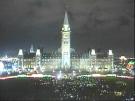 The most sensible issue that Canadian politicians seem to have been debating so unimpressively in Ottawa over the past several weeks is about how the next Canada that has already arrived is going to be democratically governed. If they finally can’t figure this out themselves, and need further help from the electorate in a fresh election, no doubt a solid enough majority of the people of Canada will finally oblige and turn out at the polls.
The most sensible issue that Canadian politicians seem to have been debating so unimpressively in Ottawa over the past several weeks is about how the next Canada that has already arrived is going to be democratically governed. If they finally can’t figure this out themselves, and need further help from the electorate in a fresh election, no doubt a solid enough majority of the people of Canada will finally oblige and turn out at the polls.
The one thing we do seem to know for certain now is that there will be another federal election sometime within the next twelve months. Whether it will be as soon as the next two months is probably not a great strategic question, from the standpoint of the larger Canadian future. And whenever it takes place, another thing we do seem to know for certain now is that it will not be breaking any records for short-lived governments, already lodged in the history books at Ottawa.
(The Canadian federal election of May 22, 1979 was quite quickly followed by a fresh election on February 18, 1980. The election of June 18, 1962 was followed by another on April 8, 1963. The election of June 10, 1957 was followed by another on March 31, 1958. And the election of October 29, 1925 was followed by another on September 14, 1926. So whatever else, the election of 2005, or 2006, will not be unprecedented in this respect.)
 Meanwhile, here’s hoping that Paul Martin, Stephen Harper, Gilles Duceppe, and Jack Layton do all go off to the Netherlands together, to salute the veterans – as the Dutch celebrate the 60th anniversary of their liberation from Hitler’s real and no doubt quite rampantly corrupt tyranny, in which Canadian soldiers played such a distinguished and too often deadly part.
Meanwhile, here’s hoping that Paul Martin, Stephen Harper, Gilles Duceppe, and Jack Layton do all go off to the Netherlands together, to salute the veterans – as the Dutch celebrate the 60th anniversary of their liberation from Hitler’s real and no doubt quite rampantly corrupt tyranny, in which Canadian soldiers played such a distinguished and too often deadly part.
The Canadians of the great generation who did more than their fair share of liberating Europe in the Second World War set the stage for the next Canada that began its long slow growth at the end of the war, with the first Canadian Citizenship Act of 1947. It has now come into its own at last. Who knows? In the spring of 2005 it could do all worried and concerned Canadians some good if the country’s four leading politicians actually do wind up standing together on some old and all-too-real battlefield on another continent, paying their respects to the memories of people who died for Canada’s free and democratic future, and so forth. Something of this sort does seem to be what is missing most in Ottawa these days.
(As it happens, the Canadian federal party leaders did arrive in the Netherlands on Monday, May 9, one day after the official 60th anniversary of VE (Victory in Europe) Day celebrations, and to some criticism from Canadian war veterans who were around for the official ceremonies on Sunday.)

